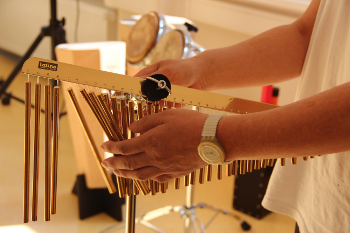by Karin Böseler

In addition to intensive medical, nursing, physical, occupational, occupational, and neuropsychological care and care, people in coma (or coma or apallic syndrome) require special care and attention. You need intensive interpersonal contact.
Music therapy offers such as singing, buzzing or improvising on musical instruments are a way of conveying security, security, human attention and warmth to people in a coma in close and intensive dialogues. This is particularly important if, besides severe physical and possibly cognitive impairments, those affected have also suffered psychological trauma.
Interpersonal music dialogues with people in a coma are closely linked to deeply rooted and prenatal experiences. They are similar to the close mother-baby dialogue (motherese, babytalk). Music therapy enables people in a coma to open up their inner experience to the outside world based on these experiences.

Music also affects the reward and “pleasure center” in the brain (ventral striatum), similar to a loving look or a loving touch in a relaxed atmosphere. Dr. Andreas Zieger added: "Music has a demonstrable effect on the whole brain: activating and calming on the tonifying structures in the brain stem." Emotions, while the left half takes on the analytical-rational achievements such as melody, timing, rhythm, pitch recognition and positive emotions. "
People in a coma react to musical offers. The music therapist pays attention to the slightest movements such as chewing and smacking movements, eyelid movements, changing the direction of view, fixing the eyes, changing breathing (deep inhalation and exhalation), physical relaxation or tension, turning the head and other body movements. Emotional signs such as a change in facial expressions, smiles or crying also suggest that people in a coma can react to their surroundings and perceive music as a positive and life-friendly, trusting affection.
Music therapy for people in a coma is an important extension of the extensive therapeutic offer, since basic needs of the person are addressed and perceived, emotional experience is changed and expanded and fears such as trauma experiences can be overcome.
Source: Andreas Zieger, music as a mediator of new life. Social sign of hope for people in coma and apallic syndrome. In: Neander, K.-D. (Ed.): Music and care. Munich: Urban & Fischer 1999, pp. 145-164.